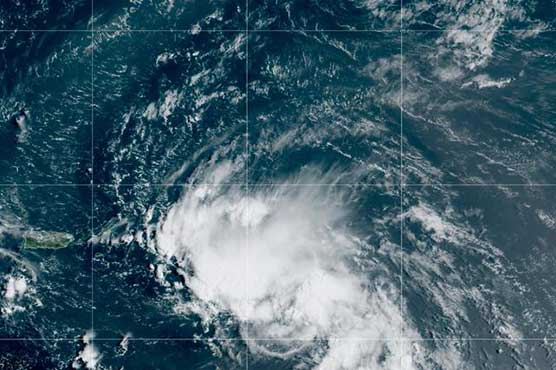'We need to be prepared': Hurricane Laura heads for US Gulf Coast

"Laura is expected to be a major hurricane at landfall," the center said.
NEW ORLEANS (AFP) - Texas and Louisiana residents evacuated flood zones and boarded up windows Tuesday as Hurricane Laura barreled towards the coastline, after earlier causing 25 deaths in the Caribbean.
The storm’s maximum sustained winds were nearing 90 mph (150 km/h), with gusts higher, the US National Hurricane Center (NHC) reported, and forecasters expect it to strengthen significantly in the next 24 hours.
"Laura is expected to be a major hurricane at landfall," the center said.
It is forecast to reach the Texas or Louisiana coast on Wednesday night. Storm surges could reach up to 14 feet (four meters) in places and will be accompanied by "large and destructive waves," according to the NHC.
The center warned that the storm surges could reach up to 30 miles (48 kilometers) inland from the southwestern Louisiana and southeastern Texas coastlines.
Texas governor Greg Abbott said Laura could reach Category 4 status, the second-highest, with winds of up to 156 mph.
"We need to be prepared," he said, especially as the state continues to struggle with the coronavirus pandemic.
He warned that high winds were expected to blow through the state’s most forested area and there was potential for tornadoes.
Compared to Category 3 Hurricane Harvey, which caused catastrophic flooding and killed 68 people in 2017, "this is going to be more of a wind event," the governor said.
Laura also threatens the major oil refining centers of Lake Charles, Louisiana and Beaumont-Port Arthur, Texas, located near the coast.
Evacuations have been underway since the morning in areas most at risk, especially on the coast where the water could rise up to three meters.
Several emergency shelters opened on Tuesday in Texas, with health precautions in place to fight the spread of the virus.
"COVID-19 is going to be in Texas throughout the course of the hurricane," Abbott said, calling on families who can afford it to take refuge in hotels or motels so they "can be isolated from others."
In New Orleans, Mayor LaToya Cantrell also called for health measures to be respected despite the threat of wind, rain and flooding.
"Don’t forget covid19 with weather effects from Hurricane #Laura on the way," she said on Twitter.
The city’s historic French Quarter was emptied of its tourists, while sandbags were piled up in front of the doorways of colonial-style buildings and windows were boarded up with plywood.
"I’m not worried about the water getting in here from the storm, I’m worried about the rain and then the pumps not working and that’s what will cause the flooding," Robert Dunlap, a business owner, told AFP.
- ‘It’s crazy’ -
=================
New Orleans remains traumatized from Hurricane Katrina, which made landfall as a Category 3 storm in 2005, flooding 80 percent of the city and killing more than 1,800 people.
Sonya McCuller, who lived through that storm 15 years ago, said anyone who survived Katrina knows they cannot know what to expect.
"One minute you may think that it’s not going to come, the next minute you’re trying to prepare to make sure you don’t get caught in it. It’s crazy, but we’re just going to see what the next one is going to do," she said.
Laura, which was 405 miles from Louisiana on Tuesday, earlier caused flooding in Haiti and the Dominican Republic, where at least 25 people died.
In Cuba, it caused material damage but no deaths.
In the Gulf of Mexico, more than 100 oil platforms were evacuated as a precautionary measure, stopping about 80 percent of oil production.
The Atlantic storm season, which runs through November, could be one of the busiest ever this year, with the Hurricane Center predicting as many as 25 named storms. Laura is the 12th so far.
Tropical Storm Marco -- which also churned through the Gulf of Mexico -- was downgraded from a hurricane and dissipated on Tuesday off the coast of Louisiana before reaching land.
Marco’s weakening winds spared the Gulf what would have been twin hurricanes, unprecedented since records began 150 years ago.

